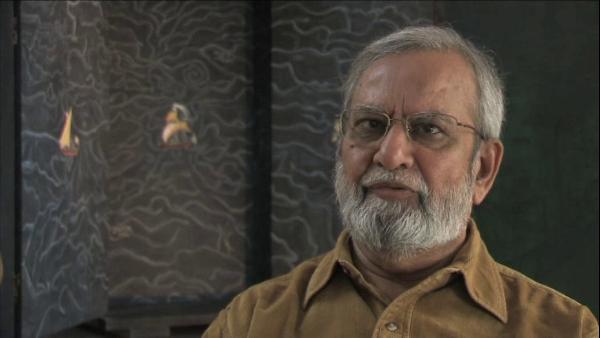NEXT STORY

Family and going to Baroda
RELATED STORIES

NEXT STORY

Family and going to Baroda
RELATED STORIES


|
Views | Duration | |
|---|---|---|---|
| 11. Mohandas Gandhi and writing | 59 | 03:58 | |
| 12. Family and going to Baroda | 60 | 05:39 | |
| 13. Life and people at Baroda | 1 | 75 | 09:20 |
| 14. Meeting other artists and developing my own style | 59 | 04:33 | |
| 15. The art scene in the '60s and my subject matter | 69 | 04:14 | |
| 16. Teaching history of art | 51 | 09:26 | |
| 17. Literary activities (Part 1) | 48 | 06:03 | |
| 18. Literary activities (Part 2) | 37 | 04:16 | |
| 19. Group 1890 and having a show | 116 | 05:53 | |
| 20. Other members of Group 1890 and our beliefs | 87 | 04:04 |


When we refer to Gujarat, you know, the name that come to your lips, the first name that comes to your lip is Gandhiji. Well, I had double interest in Gandhiji because he was also a literary man. He was associated with Gujarati Sahitya Parishad, that is the Literary Academy of Gujarat, and he wrote in impeccable Gujarati. That is something, you know, which one admires. Even today I admire his writing. It’s... you can’t shift a word. You can’t change a word in his autobiography. It’s amazing. That man was almost legalistic, you know, that his language... and I love that because he must have striven for it. Maybe he learnt it from his legal practice or maybe he learnt it from whatever literature that he knew. And, of course, from life, that he had to be frugal. But it had also other dimension, that it is economic. The language is also, you know, related to speaking only that in which, so, you use minimum of expression, minimum of words, maybe English or British perhaps. Well, I got around to something quite opposite, as far as literature is concerned. I was never... I was not... my English... my sort of reading of English literature was very limited, except for textbooks. But I came to know of other literatures and besides Gujarati, I read Hindi, I read a lot of translation from Bengali, Tagore and Sharatchandra [Chatterji]. These are all staple. In fact, I devoured them, you know, all these. So, in a way both these, at one level the family was a kind of a springboard which allowed me to enter into some of these territories. The town, which was a small town, allowed me to pursue literary activities or paint and in a way Kathiawad, for that matter, also provided that kind of a backdrop. I knew another person, somebody called Abuhai Shekhani He was a poet. He lived in a town called Morbi, which was also a very progressive state. My brother was in the postal services and was transferred and I would go and spend my summer vacation in Morbi where I met this man who, again, was interested, like Labhshankar in making small books and he had these young boys who could, who painted and who wrote. And we used to make these handwritten magazines or handwritten volumes. So, in a way, you know, these 18 years that I spent there... I mean, if I think of it, that from 10 onwards, from independence onwards, they were full of a kind of excitement also. I mean, despite the economic sort of kind of problems that we faced, there were many other areas, you know, which fulfilled. I mean, and our life was sort of not that bleak as it may sound from some of the accounts that I have given.
Gulammohammed Sheikh is an Indian painter, writer and art critic who has been a major figure in the Indian art world for half a century. His artistic career is closely associated with the renowned MS University of Baroda in Gujarat where after gaining his Master's degree, Sheikh went on to teach in the Faculty of Fine Arts, and where he was appointed Professor of Painting in 1982.
Title: Mohandas Gandhi and writing
Listeners: Timothy Hyman
Timothy Hyman is a graduate of Slade School of Fine Art, London, in which he has also taught. In 1980 and 1982, he was Visiting Professor in Baroda, India. Timothy Hyman has curated many significant art exhibitions and has published articles and monographs on both European and Indian artists.
Duration: 3 minutes, 59 seconds
Date story recorded: December 2008
Date story went live: 17 November 2010